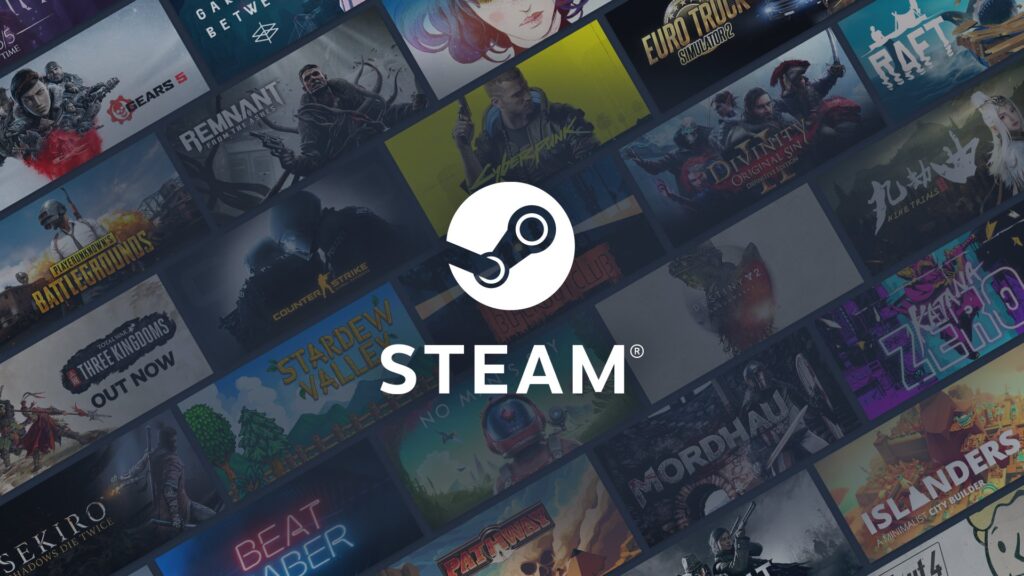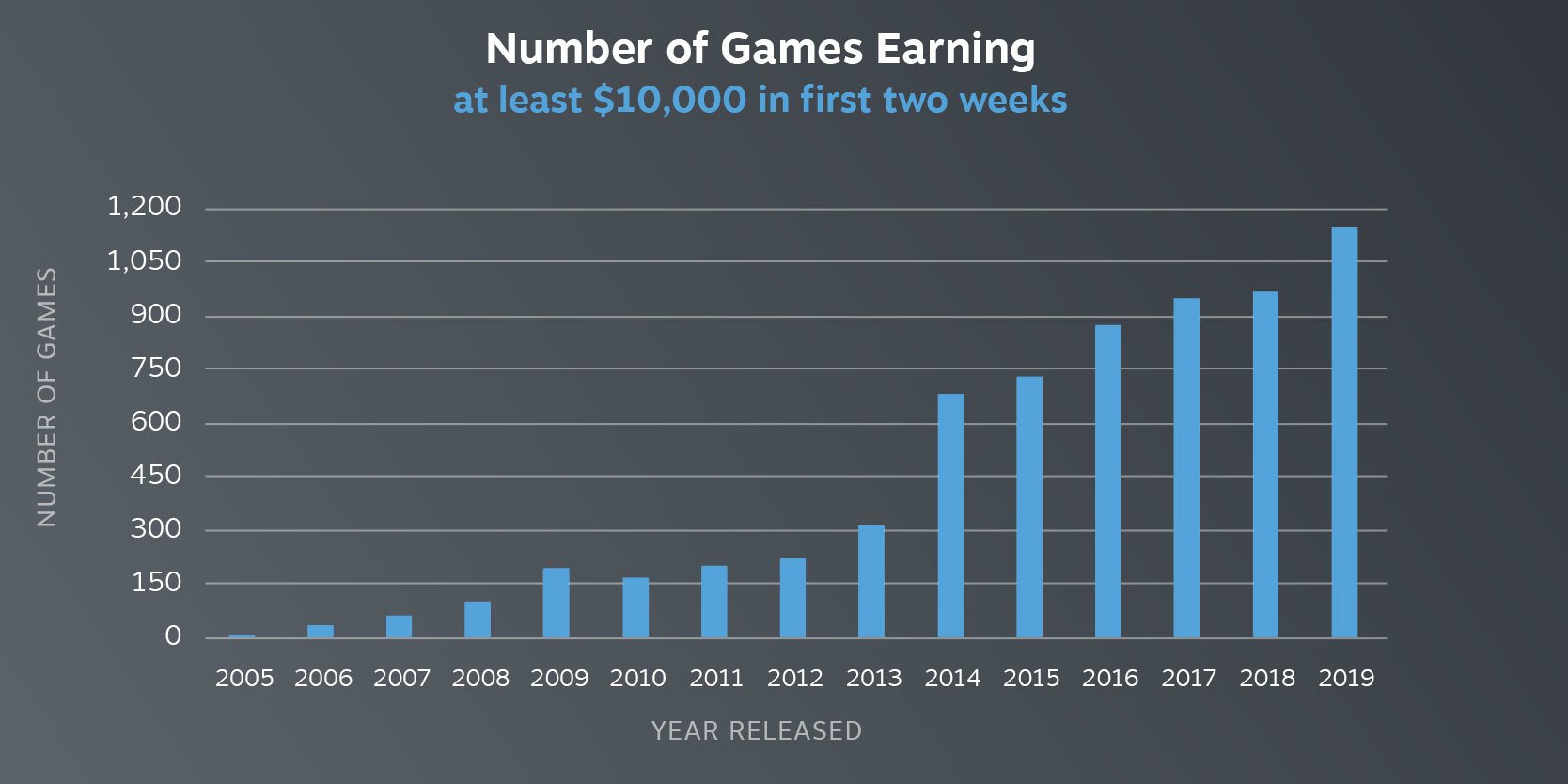
As indie publishers and developers continue to struggle with discoverability in the digital space, Valve notes that more and more games are finding success on the Steam platform. In this case, Valve’s metric for “success” is a game that brings in $10,000 within two weeks of its launch. According to Valve, in 2019 that milestone was reached by 18% more titles compared to the previous year.
The data was published in a blog post on Steam this week, in which Valve said that nearly 1,200 games surpassed that benchmark in 2019.
“The number of games meeting this success measure has increased pretty consistently over time, with an 18% increase in 2019 compared to 2018,” the post reads. “That increase wasn’t just due to a larger number of games on the platform — the proportion of games meeting success increased by 11% in 2019.”

Looking at Valve’s graphs, there’s a sizable jump from 2013 to 2014 in the number of games achieving “success.” This is reflective of the company’s decision to admit more games onto Steam beginning in August 2013, the post notes.
“Many of these games weren’t immediately ready for release, so the effect of that increase only really shows up in 2014. By 2019, more than three times as many new releases met the $10k benchmark than in 2013,” Valve said, tooting its own horn.
Valve said that the findings indicate that games that hit that $10,000 mark within two weeks often go on to earn between $20,000 and $60,000 in their first year. Additionally, the post reports that there were nearly 300 games in 2019 that earned $250,000 in their first two weeks on Steam, a number that was up significantly over the roughly 225 that reached this milestone in 2017 and 2018. All told, the median game released in 2019 earned 24% more during its first two weeks than the median in 2018.
For Nicholas Laborde, founder and executive producer at indie developer Raconteur Games, Valve’s metric of “$10,000 in two weeks equals success” is short-sighted, and cannot account for the myriad development conditions present in an industry that is more diverse and varied than ever before.
“It is irresponsible to suggest a financial goal post beyond becoming profitable as being ‘successful,’ especially in the indie space,” Laborde told GameDaily. “If you are a solo dev who spent maybe $2,500 — and lots of hours — over a year to make their project, and it earns $2,501? Hell, that’s a success to me — you didn’t lose money! That’s as simple as the definition of ‘success’ should be when it comes to money.”
Laborde said that his personal definition of “success” doesn’t involve monetary measures. Rather, it’s principal and fulfilment that ought to make a project worth pursuing.
“Success, to me, is working on something I believe is worth doing, with people I enjoy working with, and putting the results of that effort out into the world. That’s it. Nowhere in that definition does money appear,” Laborde explained. “Yes, we have bills to pay, and yes, you can’t operate on hugs and good vibes, but there’s a difference between each person, each studio, each team and their situations. Everyone has a different motivation and reason for doing what they do. Money isn’t why I make games; I wouldn’t be here if that were the reason.”
The idea of a studio using metrics from Valve rather than their own internal measuring posts in order to define how “successful” a game is is not something Laborde would ever consider. However, the conversation could be different when an indie studio is looking for outside investment.
“I think if you’re talking to investors or publishers and trying to come up with a metric, it’s fine to set some arbitrary number as a target. After all, you’ll have to do some projections for them anyway to show that you understand the business side. But telling indies that this number is what dictates ‘success’ — it’s just not a one-size fits all approach.”
At the end of the day, while it’s nice to see more indies finding an audience on Steam, Laborde said that it’s not monetary gain that will leave a lasting impact on players. In the long run, it’s the emotional connections that matter most.
“No one will measure you by how much money you made, but by the lives you impacted, and what you gave back to everyone,” he said. “That’s what’s important — making the things that only you can create. Go out. Do it. Show us the art that you are meant for. And if you do a few proactive things along the way, like building a community during development, you’ll turn a profit.”
From an objective point of view, Steam’s report is certainly interesting, but boiling the concept of success down to money earned feels antithetical to much of the philosophy underlying indie development. Devs like Laborde already grapple with discoverability, and while some steps have been taken by Valve in that regard, applying an arbitrary yardstick to an already-cutthroat industry isn’t helping anyone.
Sam, the Editor-in-Chief of GameDaily.biz, is a former freelance game reporter. He's been seen at IGN, PCGamesN, PCGamer, Unwinnable, and many more. When not writing about games, he is most likely taking care of his two dogs or pretending to know a lot about artisan coffee. Get in touch with Sam by emailing him at sdesatoff@rektglobal.com or follow him on Twitter.
 GameDaily.biz © 2025 | All Rights Reserved.
GameDaily.biz © 2025 | All Rights Reserved.